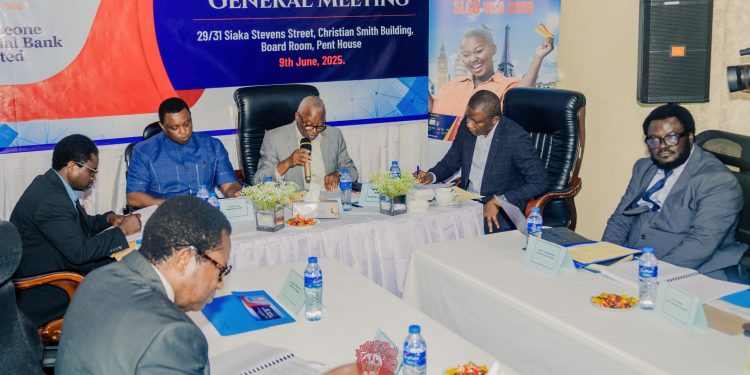During the 52nd Annual General Meeting of the Sierra Leone Commercial Bank on June 9, 2025, the Minister of Finance stated that Sierra Leone is making significant strides towards financial and digital inclusion, noting that financial services are becoming more accessible and affordable for many customers. He emphasized that the financial sector remains liberalized, with interest and exchange rates being influenced by market forces, and highlighted the banking sector’s readiness to attract capital and expertise to foster private sector-led growth.
The Minister reported an increase in bank account openings due to the introduction of more financial products aimed at enhancing digital and financial inclusion. He described the financial sector in Sierra Leone as vibrant and adaptable, taking advantage of the opportunities presented by digital evolution and financial technologies. He mentioned that through the Financial Inclusion Project and an improved regulatory environment, the national switch has been deployed, and banking platforms’ payment systems and interoperability are fully operational.
He underscored the crucial role of commercial banks in mobilizing savings from individuals and businesses and their importance in allocating capital through loans and credit across various sectors. The Minister pointed out that prudent lending practices by banks stimulate entrepreneurship, innovation, and business expansion, which in turn boosts economic activity and job creation.
The Minister characterized the Sierra Leone Commercial Bank as a symbol of resilience, having overcome a challenging past marked by governance issues and non-performing loans. With the support of President Julius Maada Bio, the new Board and Management have redirected the bank towards record profitability and asset growth. For the financial year 2024, the bank reported a net profit after tax of NLe446.5 million, a remarkable increase from NLe90.5 million in 2023, representing a 393% growth within just one year.
This momentum is expected to continue with a strategic focus on technological innovation and customer-centric practices.
He noted that the Sierra Leone Commercial Bank, owned by the state, is the largest bank in Sierra Leone by assets and plays a vital role in supporting the government through tax contributions and treasury securities purchases, which help meet fiscal objectives and provide loans to the private sector.
However, the Minister acknowledged ongoing challenges for the bank, urging improvements in operational risk management, cost efficiency, innovation in financial technology, and proactive cyber security measures. He revealed that the Ministry of Finance is in discussions with International Financial Institutions to enhance the resources available to the private sector.
The Minister affirmed that the Bank of Sierra Leone continues to shape the regulatory environment, contributing to a stable economy with low inflation, stable exchange rates, and decreasing interest rates on treasury securities. He expressed hope that not only the Sierra Leone Commercial Bank but other banks would respond to these developments by adjusting lending costs to reflect economic fundamentals.
He concluded by stating that the recent rebasing of the GDP indicates that the services sector is now the largest in the economy and reaffirmed that the role of commercial banks is pivotal in fostering inclusive prosperity and societal well-being. The Minister emphasized the commitment of the Ministry of Finance, the Bank of Sierra Leone, and stakeholders to work together to maximize the potential of commercial banks in building a resilient and inclusive economy.











